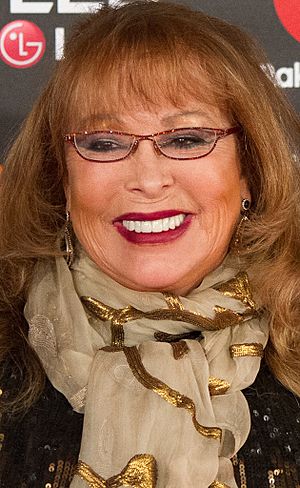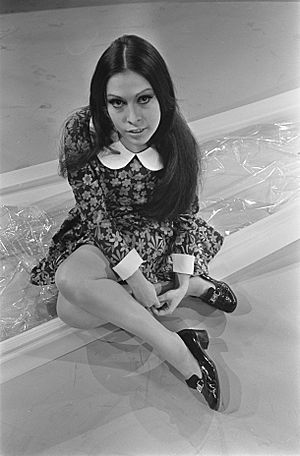Massiel facts for kids
Quick facts for kids
Massiel
|
|
|---|---|

Massiel in 2018
|
|
| Background information | |
| Birth name | María de los Ángeles Felisa Santamaría Espinosa |
| Born | 2 August 1947 Madrid, Spain |
| Genres | |
| Occupation(s) |
|
| Years active |
|
María de los Ángeles Felisa Santamaría Espinosa (born on August 2, 1947), known as Massiel, is a Spanish pop singer. She is famous for winning the Eurovision Song Contest 1968. Her song "La, la, la" made her the first person from Spain to win this big music competition.
Massiel started releasing her music in 1966. She decided to stop her music career in 1996. However, she released another album a year later and one more in 2007. She also put out new versions of her albums from the 1970s.
Contents
About Massiel's Early Life
Massiel was born in Madrid, Spain. Her father, Emilio Santamaría Martín, was an artistic manager. This meant she grew up around many singers and music groups. From a young age, she knew she wanted to be a singer, actress, and songwriter. Her mother was Concepción Espinosa Peñas.
She released her first songs in 1966. Some of these were "Di que no" and "No sé porqué". In 1967, her song "Rosas en el mar" became very popular. It was written by her friend Luis Eduardo Aute. This song helped her become a well-known singer in Spain and Latin America. In the same year, she also acted in a movie called Vestida de novia.
Winning the Eurovision Song Contest
On March 25, 1968, the original singer for Spain in the Eurovision Song Contest 1968 was changed. This was Joan Manuel Serrat, who wanted to sing his song "La, la, la" in Catalan. The song was written by Manuel de la Calva and Ramón Arcusa. Because of this, Massiel was chosen to replace him at the last minute.
Massiel was on tour in Mexico at the time. She had to quickly return to Spain, learn the song, and record it in several languages. She recorded it in Spanish, English, French, and German. She also traveled to different European cities to promote the song. Then, she went to London for the contest rehearsals.
On April 6, 1968, Massiel performed "La, la, la" at the Eurovision Song Contest. The event was held at the Royal Albert Hall. She won the competition, beating the favorite song, "Congratulations" by Cliff Richard. She won by just one point. This made her the first person from Spain to ever win the contest.
Massiel's Acting and Music Career
In 1969, Massiel appeared in the movie Cantando a la Vida. This film was about a winner of a European song festival who suddenly disappears. Massiel played the main character, María, and sang all the songs in the movie.
Later, she performed in plays. Some of her theater roles included A los hombres futuros, yo Bertolt Brecht in 1972 and Antonio y Cleopatra in 1980.
From 1966 to 1998, Massiel recorded many songs for different music companies. She released about fifty records, including singles and albums. In 1997, she released a Spanish album called Baladas y canciones de Bertolt Brecht.
Massiel made a comeback in 1981 with a new sound. Her album Tiempos Dificiles was a big success in Spain. Songs like "El Amor" and "Hello America" were very popular. She also sang covers of Mexican songs like "Eres" and "El Noa Noa".
In 1983, she released Corazon de hierro, which became a very important album in her career. This album was popular in Spain and also helped her connect with fans in Latin America. The song "Brindaremos por él" was a huge hit around the world. It reached the top of the music charts in many countries.
Massiel and the Viña del Mar Festival
During the 1980s, Massiel was invited to perform at the Viña del Mar International Song Festival in Chile. She was very popular there. At that time, Chile was led by Augusto Pinochet. After singing for an hour, Massiel received the festival's top award, La Gaviota de Plata (The Silver Seagull).
In her thank-you speech, she said: "Thank you Chile, I would like to let you know that Patricio Manns says hello from the Andes Mountains." The audience cheered loudly. Patricio Manns is a famous composer and poet. He was living in Sweden at the time, after a political event in Chile in 1973.
Later Years and Appearances
In 1997, Massiel re-recorded her Eurovision winning song "La, la, la". This new version had a 'hip-hop' beat and Spanish percussion.
In 2001, Massiel had an accident where she fell from her second-floor flat window. She was in the hospital for a short time.
In 2005, she appeared on a special show called Congratulations: 50 Years of the Eurovision Song Contest. On this show, she sang "La, la, la" again. In 2007, she was a judge for Mission Eurovision. This show chose the Spanish song and singer for the Eurovision Song Contest 2007. She also sang "Busco un hombre" on the show. It had been eleven years since Massiel had performed on stage.
In 2012, Massiel starred in the Spanish play Follies by Stephen Sondheim. She played the role of Carlotta Campion, a former film star. Her character sings the famous song "I'm still here". The play was performed at the Teatro Español in Madrid.
Massiel's Music Releases
|
Some of her singles:
|
Some of her albums:
|
Massiel's Film and Stage Roles
Film Appearances
- Vestida de novia (1967)
- Cantando a la Vida (1969)
- El taxi de los conflictos (1969)
- La vida alegre (1987)
- Dying of Laughter (1999)
Stage Performances
- A los hombres futuros, yo Bertolt Brecht (1972)
- Corridos de la revolución: Mexico 1910 (1976)
- Antonio y Cleopatra (1980)
- Follies (2012)
See also
 In Spanish: Massiel para niños
In Spanish: Massiel para niños
 | Janet Taylor Pickett |
 | Synthia Saint James |
 | Howardena Pindell |
 | Faith Ringgold |


